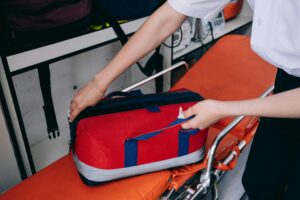Read time 5 minutes
First off—thank you, Universe. Every day I wake up feeling blessed. Recovery isn’t linear, and neither is health, but both are worth fighting for. If you’re reading this blog, welcome to my world of reflection, resilience, and plenty of research.

Living with multiple chronic illnesses is like juggling flaming swords while walking a tightrope, and then someone asks if you want to go on vacation.
For most people, travel is a break from routine.
For me, it’s a carefully choreographed dance of medications, symptoms, and contingency plans.
I live with Isaacs’ Syndrome. It is a rare autoimmune neuromuscular disorder characterized by continuous muscle fiber activity. In simpler terms, it means my peripheral nervous system is in overdrive, causing persistent twitching, cramps, and immense fatigue. It isn’t just physically taxing; it seeps into every aspect of life.
My Diagnostic Journey Also Revealed:
- Lyme disease: A tick-borne bacterial infection affecting joints, heart, and nervous system.
- Glaucoma: A degenerative eye disease that damaged my optic nerve.
- Membranous Glomerulonephritis: A progressive kidney disorder.
- Diabetes & Blood Pressure issues: Chronic conditions that made recovery complex.
- Irritable Bowel Syndrome (IBS): Gut-related problems that altered my nutrition and comfort
That’s a mouthful and a suitcase full.
But here’s the truth: I like to travel. I like the feeling of stepping into a new place, the thrill of discovery, and the quiet joy of proving to myself that I can still do hard things.
Over the years, I’ve developed a system that helps me travel safely, comfortably, and with confidence. Whether you’re managing one condition or seven, I hope this guide helps you feel empowered to explore the world on your terms.
Packing: My Survival Kit in a Suitcase

Packing is more than just choosing outfits; it’s about preparing for the unpredictable. I’ve learned to pack not just for the trip I want, but for the trip my body might throw at me.
1. Medical Documentation
I always carry:
- A letter from my doctor listing all my diagnoses, medications, and emergency protocols
- Copies of prescriptions
This paperwork has saved me more than once, from airport security confusion to carrying liquid medicines.
2. Medications & Devices
I pack all my medications in my carry-on, never checked luggage. That includes:
- Eye drops for glaucoma, stored in a temperature-controlled pouch
- Blood pressure meds and my glucometer for diabetes
- Immunosuppressants for glomerulonephritis
- Magnesium supplements and muscle relaxants for Isaacs’ Syndrome
- Anti-inflammatory meds and probiotics for Lyme and IBS
- Hand sanitizer (at least 60% alcohol)
- Masks (especially for crowded places)
I also bring a pill organizer labeled by day and time, plus a backup supply in case of delays.
3. Comfort Items
Travel can be physically demanding, so I carry:
- A neck pillow and compression socks for long flights
- Loose, breathable clothing to accommodate bloating or muscle twitching
- A small heating pad for abdominal and back pain
- Noise-canceling headphones and sunglasses to manage sensory overload
These items help me feel more like myself, even when my body’s acting up.
Planning: My Travel Blueprint

I treat travel like a strategic operation, because it is.
1. Researching Healthcare Options
Before I book anything, I research:
- Clinics near my destination (in case)
- Pharmacies that carry my medicines.
I also look up local emergency numbers and save them in my phone. It’s not paranoia, it’s preparedness.
2. Choosing the Right Stay
Hotels can make or break a trip. I always call ahead to ask:
- Medium-firm mattress as a bed that’s too soft causes back pain
- Is there a refrigerator in the room for my medicines?
- Can I get a quiet room?
- Is there open space in the room, as I don’t like it to be claustrophobic. I am someone who thrives in open, airy environments
3. Building a Flexible Itinerary
I don’t overbook my days. I plan one major activity per day, with plenty of rest time built in.
I also schedule ‘buffer days’ between travel. My body needs time to adjust, and I’ve learned to honor that.
Airports: Navigating with Grace

Airports are chaotic, overstimulating, and often unforgiving, but they don’t have to be.
1.Requesting Assistance
I contact the airline’s special assistance desk before I travel. They’ve helped me:
- Skip long lines at security
- Get wheelchair support when fatigue hits
These services are there for a reason, and I prefer using them.
2. Security Screening
I carry a medical notification card that explains my conditions and devices. If I’m carrying liquid medications or medical devices, I ask for a private screening. It’s faster and less stressful.
3. Time Buffer
I arrive at the airport early. Rushing triggers my symptoms, and I deserve a calm start.
Hotels

For me, hotels are more than beds; they’re where the day’s plans come to life.
1.Room Setup
I request:
- A fridge for medications and snacks
- Extra pillows for muscle support
- A room on a quiet floor, away from elevators
At times, I carry a small nightlight for nighttime bathroom trips (thanks, glaucoma).
2. Emergency Plan
I save the nearest hospital’s number in my phone and let the front desk know I have medical needs. I don’t overshare, just enough so they know how to help if needed.
Eating on the Road: IBS & Diabetes-Friendly Tips

Food is one of the biggest challenges. Navigating IBS, Ayurvedic dietary rules, and diabetes is already a delicate balancing act, and travel only raises the stakes.
- I stuck to hot, freshly cooked food
- Avoid raw or street food. Made sure of its hygienic
1. Snacks
I carry:
- Protein bars
- Nuts, rice cakes, and electrolyte powder
- Herbal teas that soothe my gut
These keep my blood sugar stable and my stomach calm between meals.
2. Restaurant Strategies
I research menus ahead of time (many apps help). I also call restaurants to ask about ingredients (artificial colour, gluten, ajinomoto, etc). Most places are accommodating.
I also eat smaller portions and avoid trying too many new foods at once. My gut appreciates the caution.
Mental Health & Mindset

Traveling with chronic illness isn’t just physical, it’s also emotional. There’s anxiety, fear of flare-ups, and the pressure to “keep up.” I’ve learned to be gentle with myself.
Final Thoughts: You Deserve to Travel

If you’re reading this and nodding along, know this: your body may be complex, but your spirit is unstoppable. You deserve joy, exploration, and adventure, just like anyone else. Traveling with rare diseases isn’t easy, but it’s possible. It’s about preparation, self-awareness, and the courage to say, I’m going anyway and everywhere.
I’ve had flare-ups in the places of visit. I’ve missed tours and slept through sunsets. But I’ve also laughed in new languages, tasted foods I never imagined, and felt the thrill of independence in places far from home.
So, pack your meds, plan your route, and go; you belong in it.
DISCLAIMER
I’m not a doctor; these reflections are based on personal experience and do not constitute medical advice. Always consult your healthcare provider when exploring therapeutic options.


